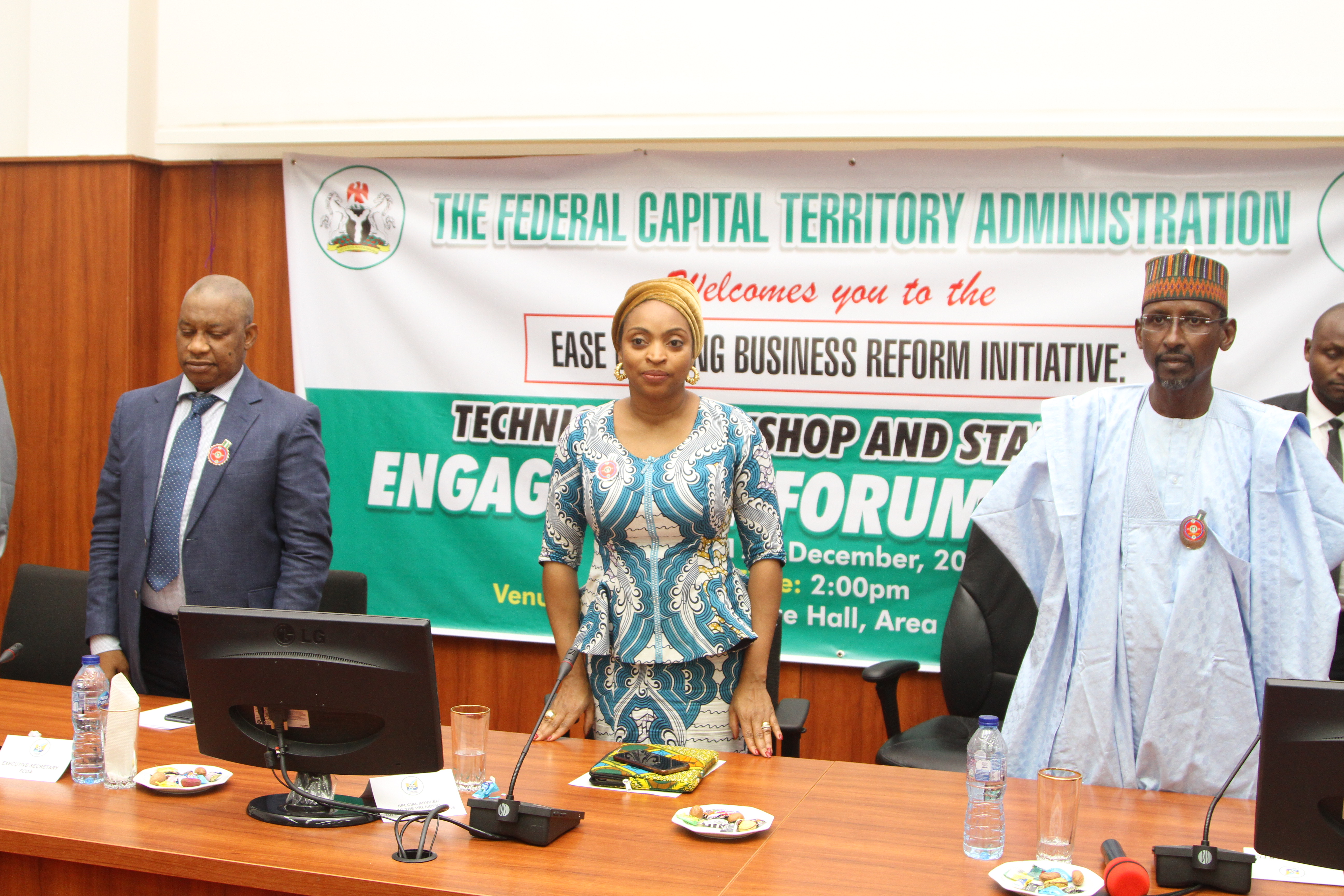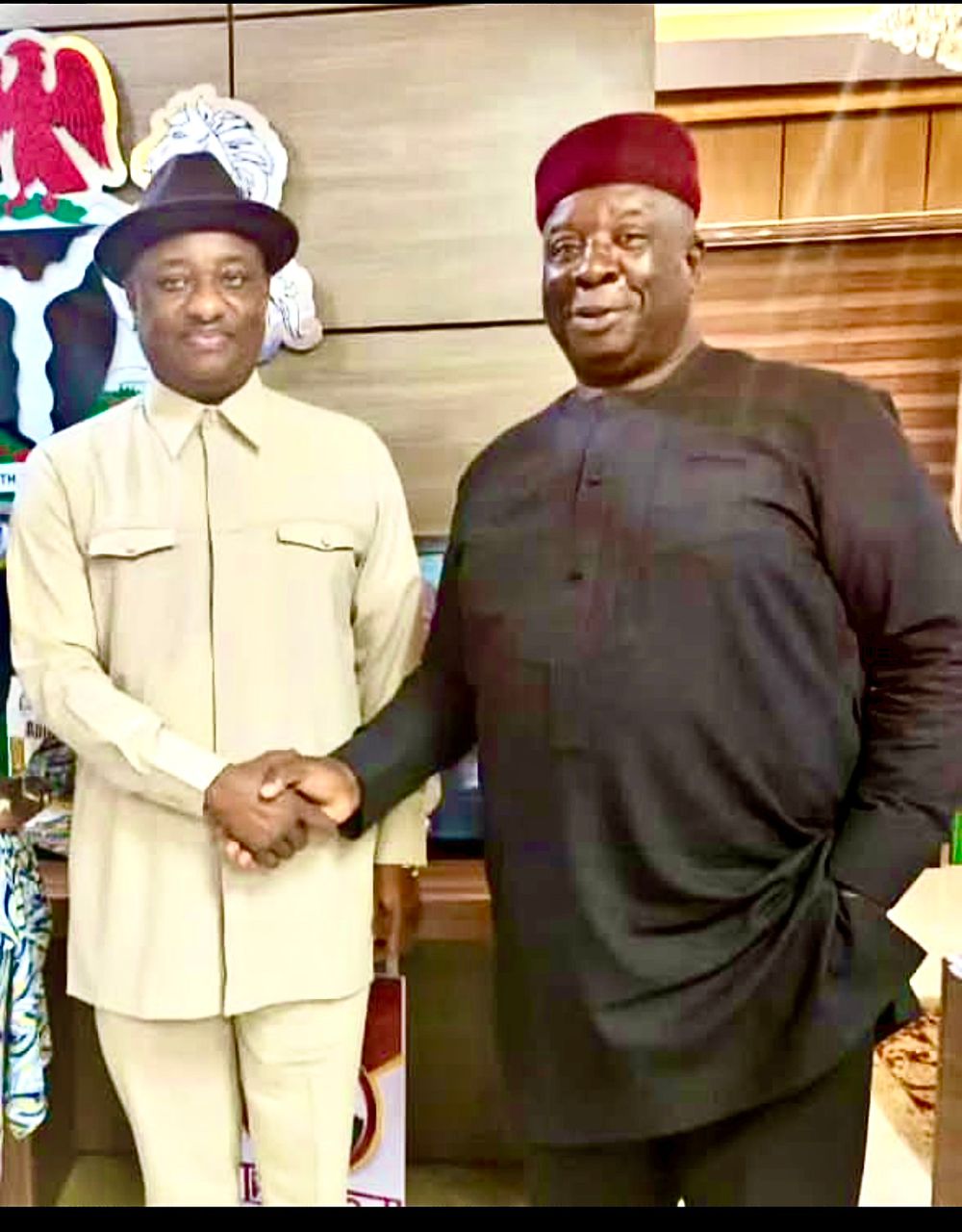Featured
Ease of Doing Business: FCTA To Harmonise Overlapping Laws

Joel Ajayi
Minister, Federal Capital Territory (FCT), Malam Muhammad Musa Bello has said that the FCT Administration is working towards harmonizing overlapping laws and regulations within the various Secretariats, Departments and Agencies (SDAs) that were militating against the ease of doing business processes in the FCT.
This, he said, could be achieved with collaborations of all stakeholders.
The Minister disclosed this at the FCT Technical Workshop and Engagement Forum on Ease of Doing Business, held in Abuja. He further said that improving the ease of doing business was at the root of Nigeria’s recovery and growth plan of the current administration with a significant progress already recorded in the last four years.
He explained that Abuja being the mirror of the country must, therefore, be a model in the ease of doing business agenda of the Administration that should be emulated.
The Minister reiterated that he was optimistic that with consistent dialogue and focus on ultimate goals, in a few years to come, processes and interventions will be institutionalized to ensure that the FCT becomes a model.
He also expressed the desire for a small working group involving key agencies within the FCTA and the Area Council Chairmen to resolve issues rose at the workshop, stressing that all businesses and services ultimately, are domiciled in the Area Councils.
Malam Bello explained that whatever intervention done at the highest level, if it does not trickle to the Area Council level where businesses are domiciled, the effects would not be felt.
He stressed the need to institutionalize the ease of doing business initiative as that was the only way the reforms will take root and flourish. . He added however, that with continuous work on improving steps, over a period of time, the reforms can be sustained and institutionalized.
Malam Bello also commended the Presidential Enabling Business Environment Council (PEBEC), adding that the purpose for its establishment was justified and so far the organization has done the country proud.
He assured the Special Adviser to the President on Ease of Doing Business, Dr. Jumoke Oduwole, that the FCTA will partner with her team so as to ensure that the laudable objective of the initiative comes to fruition.
Earlier, in her presentation, Dr. Oduwole said that the Ease of Doing Business initiative correlated with the priorities of the Federal Government because it is linked with security, the economy and the anti-corruption crusade of the government. In her words; “When people have jobs, they are occupied and are less likely to be doing what they shouldn’t be doing” she continued; “Ease of doing business is linked with anticorruption because when people have jobs and are making money, there is less need for corruption”.
She said that the ease of doing a business intervention is intended to change people’s perception that it is difficult to do business in Nigeria and to remove bureaucratic bottlenecks so that businesses can thrive. This, she said, is being done through a reduction in the cost and the time it takes to do business.
While commending the FCTA for improvements in its Ease of Doing Business profile, the Presidential Aide stressed the need to do more, especially in the area of enforcing contracts.
Stressing the need for collaborations amongst organizations in the FCT, Dr. Oduwole said that once there are strong collaborations and patience among partners, the ease of doing business initiative will be institutionalized and owned by the people.
She said: “There is a need for collaborations. We need to break down the silos. When organizations come together to work, there are chances for greater success. But there is also a need for patience. The decay did not happen overnight and will take time to resolve. Time to build strong collaborations and institutions”.
The workshop had in attendance top management staff of the FCTA including the Minister of State, Dr. Ramatu Tijjani Aliyu, the Permanent Secretary, Sir Chinyeaka Ohaa and the Executive Secretary, FCDA, Engr. Umar, Gambo Jibrin.
Featured
CELEBRATING A CENTURY-OLD CIVIL AVIATION SECTOR TRAJECTORY IN NIGERIA

This week, millions of Nigerians and others across the globe will join the Ministry of Aviation and Space Development under the irrepressible leadership of the Honourable Minister, Festus Keyamo(SAN),and all the notable Aviation sector stakeholders in and outside the country,in celebrating a century of Nigeria’s civil aviation history.
There is no doubt that under the present leadership of the Honourable Minister and within the short spell of time in his stewardship,he has consciously and intentionally embarked on a “silent revolution” for the industry with very veritable and laudable landmarks that have consistently grown the industry.
Some of these spirited efforts for instance have consequently led to trust restoration amongst international lessors, financier,any global partners.Of note also is assidiously working for the full domestication and implementation of the “Cape Town Convention Agreement” ,which gives Airlines access to modern fleets of competitive rates as well as enforcement of IDERA(Irrevocable Deregulation and Export Request Authorization).
Having well applauded these vital contemporary initiatives,it will also be germane to cast our minds in retrospect by taking a peep into our history over several decades to recognise some of the notable forebears in the industry whose impressionabl efforts cannot be overlooked,as they took the impetuous initiatives of breaking the ice at the nascent stage.
It will aptly corroborate the truism which says that… ” a journey of a thousand miles starts with one step”.
The above is vividly captured from a tribute by the First Republic Minister of Aviation Chief Mbazulike Amaechi at the funeral of late Igwe of Oba,HRH Peter Ezenwa(MFR) in 2018.
It states inter alia…”One significant thing I will say many people didn’t know is that the first indigenous airline that was to run in Nigeria was known as “STANDARD AIRLINE”.It was founded in 1966 by a company formed by Igwe Peter Ezenwa from Oba,and had on board,John Nwankwu from Abagana,Edward Ebo from Ezinifitte,(all from Anambra state),John Anyaehie from Nkwerre in Imo state,and lastly my very self Mbazulike Amaechi.
The five of us later acquired two brand new aircrafts,and had four pilots,namely;Unachievable,John Emma Ngwu and Felix Offor,who was to be the General Manager of the airline.
But just about the time for the take-off the crisis of the military takeover erupted in the North as the planes were on their way for delivery to us.In fact the bank handling the transaction was to allow the planes to be flown from the USA,but the news of the war broke out in 1967,the insurance company cabled for the cancellation of the deal as they will not be able to cover the risk cost of aircrafts being flown into war zone.
So,we asked the manufacturers to take the two aircrafts back to their country and hold on for six months with the hope of that the war will end within the requested time frame,but the war didn’t end as thought.We consequently asked for refund and they deducted some money and refunded the balance which was deposited at the London branch of African Continental Bank(ACB).
When the government took over the operations of ACB,we still hoped for the refund but unfortunately were disappointed that the Federal government took over the whole money and we lost everything.”
Further in line with our historical perspective,it will also be pertinent some of the later years reformists in the likes of Engr Onyereri and Harold Demuren who advertently sponsored some far reaching regulations that eventually steered the industry towards greater autonomy with the passage of the 2005 Civil Aviation Act,which I was also a prime participant of in my capacity as an Aviation sub chair in then House of Representatives.
As we mark this great century milestone,and with the clear evidential pathway set out by the current managers of the industry under the indomitable leadership of Honourable Minister, I do not see the sky posing any limitations as they say,but rather availing new vistas of limitless growth opportunities.
CONGRATULATIONS.
Hon Chidi Nwogu
Former member House of Representatives & presently Governing Council member
,African Aviation and Aerospace University,Abuja.
-

 Featured6 years ago
Featured6 years agoLampard Names New Chelsea Manager
-

 Featured6 years ago
Featured6 years agoFG To Extends Lockdown In FCT, Lagos Ogun states For 7days
-

 Featured6 years ago
Featured6 years agoChildren Custody: Court Adjourns Mike Ezuruonye, Wife’s Case To April 7
-

 Featured6 years ago
Featured6 years agoNYSC Dismisses Report Of DG’s Plan To Islamize Benue Orientation Camp
-

 Featured4 years ago
Featured4 years agoTransfer Saga: How Mikel Obi Refused to compensate me After I Linked Him Worth $4m Deal In Kuwait SC – Okafor
-
Sports3 years ago
TINUBU LAMBAST DELE MOMODU
-

 News12 months ago
News12 months agoZulu to Super Eagles B team, President Tinubu is happy with you
-
Featured6 years ago
Board urges FG to establish one-stop rehabilitation centres in 6 geopolitical zones
